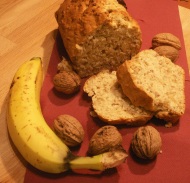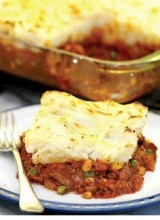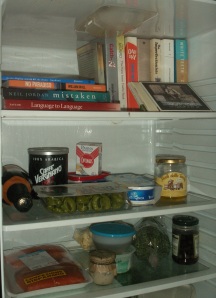Ingredients (for a big loaf)
- 400 gr of self-raising flour

- 60 gr of brown sugar
- 2 teaspoons of baking powder
- 60 gr of walnuts
- 60 gr of butter or margarine
- 2 eggs
- 4 ripe bananas
Grease a loaf pan or line it with greaseproof paper. Mix flour, sugar and baking powder in a big bowl. Cut the butter into small pieces and rub into flour mixture. In a separate bowl, mash the bananas and add in the eggs. Then combine with flour kneading gently so that no lumps are formed. Finally add in the chopped walnuts and stir through (you may need to add some extra flour if the mixture is too wet). Pour the batter into a loaf pan and bake at 180°C for about 30 minutes or util a toothpick inserted comes out clean.
A big thank you to Phil who made me change my mind about bananas! 🙂
Cosa sarebbe una lingua senza idioms? Senza quelle espressioni idiomatiche che confondono tanto chi è alle prime armi? Forse una lingua più semplice, ma sicuramente priva di quel colore che la rende unica. Gli idioms sono delle espressioni che hanno un significato figurato e quindi non vanno mai tradotte alla lettera. Sono usate di frequente nel parlato e in generale in contesti informali, ne esistono di più arcaiche e di più recenti, ma quello che è certo è che ogni lingua ne produce di nuove in continuazione!
Bananas and nuts sono gli ingredienti principali di questa ricetta, ma anche la causa di errori grossolani e confusione quando si tratta di idioms. Ecco qualche esempio:
When I realised someone had stolen my bike I went bananas!
Non vuol dire che mi sono consolato del furto della bici mangiando una banana, ma che sono andato su tutte le furie. E’ un composto del verbo go, quindi bisogna ricordare le forme irregolari per il Past simple e il Past participle (go bananas – went bananas – gone bananas).
What about nuts? Buone da mangiare, ma anche da far perdere la testa! Ecco qualche esempio:
I’m absolutely nuts about this new recipe = I’m enthusiastic about it, I love it.
Ma un idiom simile può essere usato anche per espreimere un sentimento negativo, rabbia e insofferenza. Ad esempio:
Turn down the TV! It’s driving me nuts! = I can’t stand it, I hate it.
Un po’ confusi? Ed è appena l’inizio! Sì, perchè la lingua inglese è ricchissima di idioms e ancor più di quelli basati su cibi e bevande. Ad esempio?
She is the apple of my eye, I love her. (la luce dei miei occhi)
You spend your life in front of the TV, you’re a real couch potato! (sei un pigrone)
Those guys are the cream of the crop, I’m sure they’ll get a job in no time. (i migliori di un gruppo)
How can you be as cool as a cucumber with all that’s going on? (rimanere impassibile)
Their new CD is selling like hotcakes. (andare alla grande, vendere molto)
This test was a piece of cake. I finished it all in 15 minutes. (un gioco da ragazzi)
Musicals are not my cup of tea, I can’t stand people singing and dancing all the time! (la mia passione)
La lista sarebbe lunga: that was idioms in a nutshell! (in poche parole)



